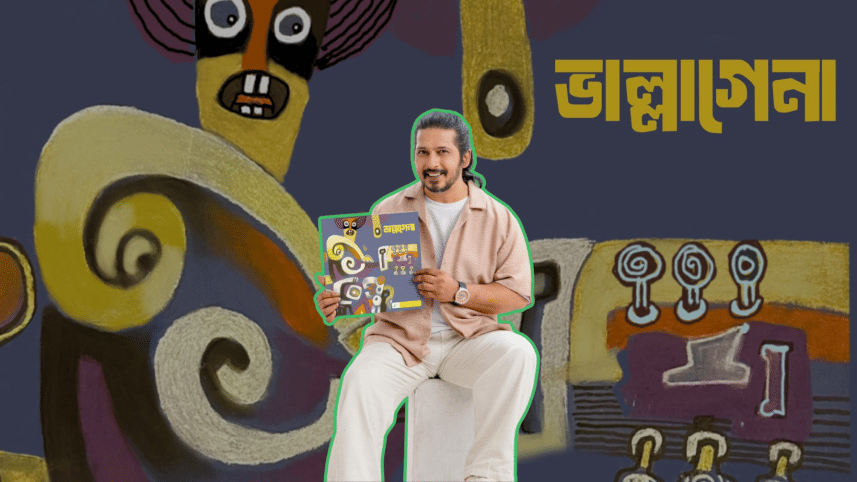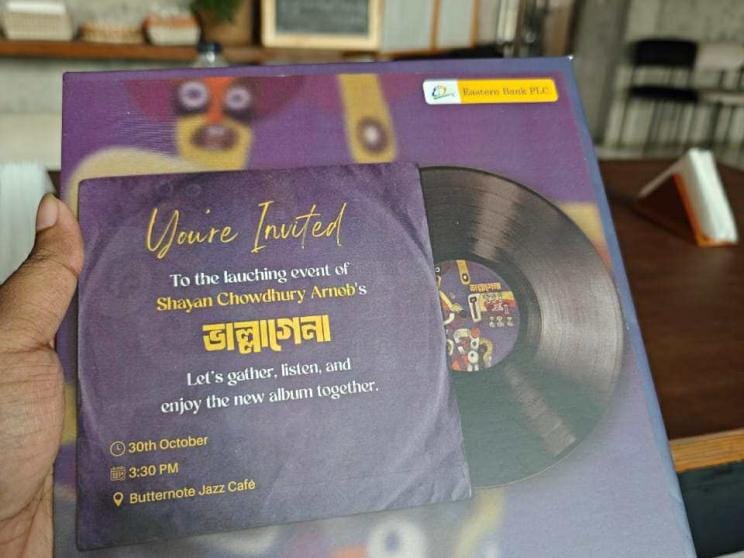‘Bhallagena’: Arnob’s new album is a triumph of cohesion and variety

"I promise that I won't take another 10-year gap to release my next album!" jested Shayan Chowdhury Arnob, at the intimate launching ceremony of "Bhallagena" on October 27. This was his first solo album after "Doob", which was released in 2015. A 10-year gap can be devastating to a musician, even someone of Arnob's stature—times change, styles become outdated, and industries move on. But this is Arnob we're talking about—he helms Coke Studio Bangla, performs all over the world, and has relentlessly reinvented himself throughout the years, all while keeping his signature, quirky timelessness, which is also evident in "Bhallagena".
When an artist takes a long time away, expectations run high, and the album's reception may hinge on how it compares with his earlier landmark works, of which Arnob has many. On top of that, Arnob tends to work with poetic lyrics and deeper themes, which means that the audience will likely take time to fully absorb his compositions. Featuring contributions from Kolkata-based friend Taufiq Riaz (writer of popular songs like 'Bhalobasha Tarpor' and 'Tor Jonno') and the late Rajib Ashraf, the album serves as a poignant tribute to the latter.

The album starts with "Joker", penned by Srijato Bandopadhyay. Its lilting rhythm and evocative, floating imagery speak of both the liberating flight and the inherent fragility of existence. But the emotional anchor is the title track, "Bhallagena Kichu". This duet, featuring Arnob and his beloved, Sunidhi Nayak, is a raw, palpable burst of feeling—it functions simultaneously as a deep lament for a lost friend and a cathartic release. This was the last song that Rajib Ashraf gave Arnob, before his untimely demise.
"Dushtu Cheler Gaan", by its unusual, mischievous nature, is a groovy treat, accentuated by the masterpiece of a bassline by Faizan Rashid Buno.

"Haay Chil" adapts a Jibanananda Das poem. It deliberately slows the pace, drawing the listener into a meditative and dreamlike space, a clear echo of the longing and solitude that have always permeated Arnob's best work. This particular song has been composed by The Seesaw Quartet, headed by tenor saxophonist Rahin Haider.

The latter half of the album further develops this reflective mood. "Tomar Mati" offers a feeling of deep belonging, grounded in earthy and resonant musical layers. "Shopnorogi" introduces a trance-like state and elevates not only the album, but the listener.
The album is concluded by "Okale Brishti", which translates the chaos of sudden rain into a metaphor for unresolved, tempestuous inner feelings.

"Bhallagena" is a triumph of cohesion and variety; it feels like a collection of small, emotionally charged vignettes that form a much larger, cohesive emotional landscape. It is an album that demands to be absorbed whole, in a single sitting, where the silence between the songs often speaks with the same eloquence as the music itself.
The album is a thoughtful, mature comeback from Arnob—one that leverages his strengths wonderfully. For fans of the artiste's previous work, this is a welcome and satisfying escapade. For newcomers, this might be a great entry point into the more reflective side of Bangladeshi music.




 For all latest news, follow The Daily Star's Google News channel.
For all latest news, follow The Daily Star's Google News channel.
Comments